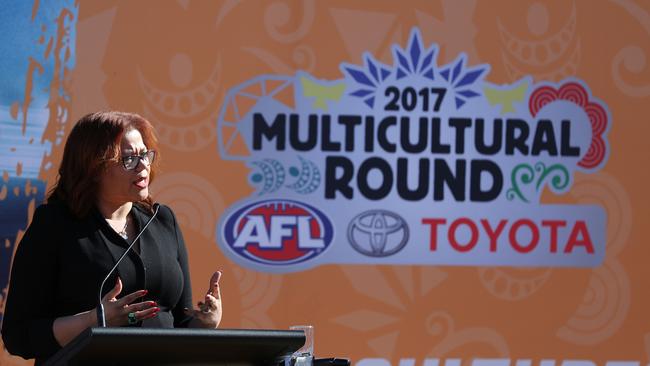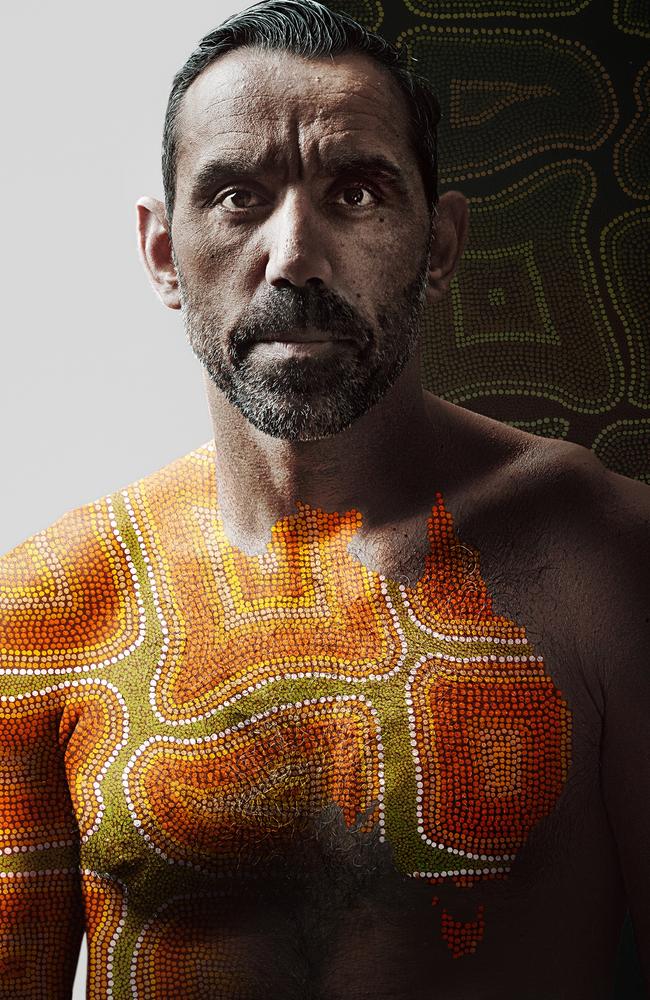AFL general manager of inclusion and social policy Tanya Hosch shares her private journey
Tanya Hosch was adopted at just three weeks old and her search for her biological parents and culture continues, as does her work on Aboriginal programs in the AFL. Listen to the Black Australia Podcast here.

Sport
Don't miss out on the headlines from Sport. Followed categories will be added to My News.
- Milera and Johncock lead Crows on pre-season trip to Narungga country
- How to get the most out of your Advertiser digital subscription
AFL executive Tanya Hosch’s determination to find her biological parents and connect with her Torres Strait Islander culture is mirrored in her fight to keep the Aboriginal and community arm of clubs alive amid the league’s coronavirus restructure.
In many respects for Ms Hosch it feels as though her life’s work on a personal and professional level are now intersecting as the AFL’s general manager of inclusion and social policy presents a crucial voice at the game’s highest level.
On a personal note, Ms Hosch’s journey to discover her identity continues after she was adopted into a family with an Aboriginal father and white mother when she was just three weeks old.
She is yet to find her biological mother who is Welsh or her father, a Torres Strait Islander, but she did have an emotional trip to the Islands in 2015.
“I haven’t connected with them after many, many years of trying to track them down but that journey isn’t over,” Ms Hosch told The Advertiser’s Black Australia Podcast.
“It’s a bit like an aching wound in a sense, without trying to be too dramatic, but as black fellas one of the key things to who you are and how you operate and where you fit is being really clear about your identity.

“So not being able to be precise about that does limit me in many respects, as well as at a more personal level wanting to connect with culture and knowing what my culture is in a more specific sense would mean a lot to me.
“I have a 12-year-old daughter too so wanting to make sure she doesn’t have to navigate that on her own which is kind of what I felt like I have tried to do.
“I’d been invited up there (Torres Strait) but I was so nervous to go in case people didn’t take to me well.
“So I waited until I was resilient enough and in my last job at Recognise we had this journey to recognition all around the country and that gave me an opportunity to go up and spend time there.
“I got to Thursday Island and Murray Island and even got to visit the grave of Eddie Mabo and honour him, it was an amazing experience and I remember having to go and do a presentation with my joint campaign manager Tim Gartrell to the Torres Strait Regional Authority and I can’t tell you how nervous I was.
“And the first comment after my opening remarks was ‘welcome home, sis’ and I was overwhelmed, it was an incredibly generous act and I’ve had beautiful experiences when I’ve been up there.”
On a professional level, Ms Hosch said the league had gathered so much positive momentum following the release and subsequent conversations around the Adam Goodes documentaries that she was determined it would not fall flat.
“There was some amazing bread broken over the conversations we had by virtue of The Final Quarter and The Australian Dream and I feel like we have some real momentum around that, so I really hope that the game going forward can continue to have those conversations,” she said.
“Because you certainly can’t address issues that you can’t talk about ... my view is if racism occurs let’s talk about it more not less because it’s only through that that we can really make change.
“We’ve got to remember how important community engagement is through football to the social fabric of the game, but also the country.
“It’s why we’re all here and the fact that I’m at the (AFL) table is hopefully a good thing and means I can pass on those concerns and ideas that exist at other levels of our ecosystem.”
With the majority of staff at AFL clubs currently stood down, Ms Hosch admitted she was concerned about the immediate future of Aboriginal programs but said their success was fully dependent on a healthy AFL industry.

“Of course I’m concerned, I think we all are because the reality is the recovery period is probably going to take longer than we would like,” she said.
“There’s going to be a number of tough decisions that need to be contemplated in terms of that.
“There are real talent pathways like the women’s Aboriginal academy at Port Adelaide but the work is bigger than just the talent, it’s about us as an industry or sporting code that occupies a huge amount of space in the Australian landscape to play our part in contributing to community strength and wellness.
“I have a much more tangible sense of how real that is now that I work in football and see it up close.
“The dedication of staff and players who contribute to this is really special and you see the impact it has on young lives, and I’m reminded of the great piece Mark Robinson wrote about Sydney Stack (this month).
“Without question the Aboriginal and Torres Strait Islander journeys into football and the success they achieve set stunning examples to the country of what’s possible and they are important role models in our communities.
“The work will always be important I don’t think there’s any risk of it (the work) being forgotten but in the context of the challenges we are facing at the moment, we are all going to have to be really clear about how we weigh up some of the clear business and financial concerns that must be dealt with in order or us to be able to run these programs.
“I don’t have strong enough words to highlight the importance of this work across every club and the AFL and the partnerships we’ve had with the businesses that come to the table.
“We’re going to have to protect and guard this work but also realising that for us to do our best we need the industry to be strong and that’s just the harsh reality of it.”
In Episode 5 of the Black Australia Podcast, Ms Hosch also discusses:
- Her experiences of racism at high school and entering the workforce.
- Her conversation with Adam Goodes after the twin documentaries on the end of his career were released.
- The growth of women’s football on the field and the need for it to extend to the most senior levels of the game’s administration.
- The future of the AFL’s Indigenous All Stars Camp and All Stars Game.
reece.homfray@news.com.au

